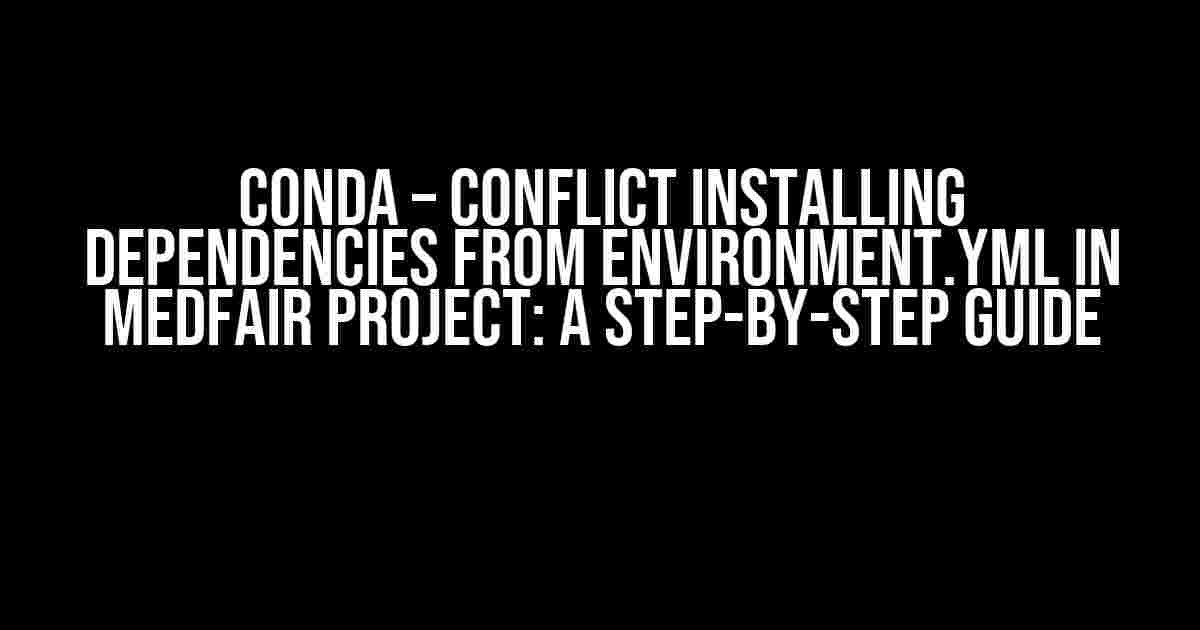Are you tired of encountering conflicts while installing dependencies from an environment.yml file in your MEDFAIR project using conda? Look no further! This article will walk you through the process of resolving conflicts and successfully installing dependencies using conda.
What is MEDFAIR?
MEDFAIR is a machine learning-based project that leverages Python and its vast ecosystem of libraries to build predictive models for medical imaging analysis. As a MEDFAIR developer, you’re likely familiar with the importance of managing dependencies and environment configurations using tools like conda.
The Problem: Conflict Installing Dependencies
When working with environment.yml files in your MEDFAIR project, you might encounter conflicts while installing dependencies using conda. This can occur due to version incompatibilities, package conflicts, or incorrect environment configuration. These issues can be frustrating and time-consuming to resolve, but fear not! We’re here to help you overcome these hurdles.
Common Error Messages
Package 'package-name' is not available for 'python=3.8'Conflict: package 'package-name' is incompatible with package 'other-package-name'ERROR conda.core.solve.SolveException: Packages are incompatible
Step 1: Create a New Environment
Before we dive into resolving conflicts, let’s create a new environment for our MEDFAIR project. Open your terminal or command prompt and run the following command:
conda create --name medfair-env python=3.8
This will create a new environment named “medfair-env” with Python 3.8 as the interpreter.
Step 2: Activate the Environment
Activate the newly created environment by running:
conda activate medfair-env
You should now see the environment name “medfair-env” prefixed to your command prompt or terminal.
Step 3: Create an environment.yml File
Create a new file named “environment.yml” in the root of your MEDFAIR project directory. Add the following contents to the file:
name: medfair-env
channels:
- defaults
- conda-forge
dependencies:
- python=3.8
- pip
- numpy
- pandas
- scikit-learn
- tensorflow
This file specifies the environment name, channels, and dependencies required for our MEDFAIR project. You can add or remove dependencies as per your project’s requirements.
Step 4: Install Dependencies using Conda
Run the following command to install the dependencies specified in the environment.yml file:
conda env update --file environment.yml
This command will update the environment with the specified dependencies. If you encounter conflicts, don’t worry! We’ll address them in the next step.
Step 5: Resolve Conflicts
If you encounter conflicts during the installation process, you’ll see error messages indicating the incompatible packages. Let’s resolve these conflicts step-by-step:
Method 1: Downgrade Incompatible Packages
Identify the incompatible package and check its version history using:
conda search --info package-name
Find a compatible version and add it to your environment.yml file:
dependencies:
- package-name=1.2.3
Update the environment using:
conda env update --file environment.yml
Method 2: Remove Conflicting Packages
If downgrading is not possible, remove the conflicting package from the environment.yml file:
dependencies:
- !package-name
Update the environment using:
conda env update --file environment.yml
Method 3: Use an Alternative Package
If a package is no longer maintained or has compatibility issues, consider using an alternative package that provides similar functionality:
dependencies:
- alternative-package-name
Update the environment using:
conda env update --file environment.yml
Step 6: Verify the Environment
After resolving conflicts, verify that the environment has been updated successfully:
conda env list
This command will display a list of packages installed in the environment. Check that all dependencies are present and have the correct versions.
| Package | Version |
|---|---|
| python | 3.8.10 |
| numpy | 1.20.0 |
| pandas | 1.3.5 |
| scikit-learn | 0.24.2 |
| tensorflow | 2.5.0 |
Conclusion
By following these steps, you should be able to successfully install dependencies from an environment.yml file in your MEDFAIR project using conda. Remember to create a new environment, activate it, and update the environment with the specified dependencies. If you encounter conflicts, use the methods outlined above to resolve them. With these steps, you’ll be well on your way to building and deploying machine learning models for medical imaging analysis using MEDFAIR.
Additional Tips and Tricks
- Use
conda env exportto export the environment configuration to a YAML file. - Use
conda env update --pruneto remove unnecessary packages from the environment. - Use
conda info --envsto display a list of all environments on your system.
By mastering conda and environment management, you’ll be able to focus on what matters most – building innovative solutions for medical imaging analysis with MEDFAIR.
Here are 5 Questions and Answers about “Conda – Conflict Installing Dependencies from environment.yml in MEDFAIR Project”:
Frequently Asked Question
Having trouble with installing dependencies from environment.yml in your MEDFAIR project? Don’t worry, we’ve got you covered!
Q1: What is environment.yml and why is it important in MEDFAIR project?
environment.yml is a configuration file that specifies the dependencies required to run your MEDFAIR project. It’s important because it ensures that all dependencies are installed correctly, which is crucial for reproducibility and collaboration.
Q2: What causes conflicts when installing dependencies from environment.yml?
Conflicts can occur when the dependencies specified in environment.yml have different version requirements or are incompatible with each other. This can lead to errors during installation, making it difficult to set up your project environment.
Q3: How can I resolve conflicts when installing dependencies from environment.yml?
To resolve conflicts, try updating the environment.yml file by specifying more flexible version ranges or using specific versions that are known to work together. You can also use conda’s built-in conflict resolution tools, such as `conda info` and `conda debug`, to diagnose and fix the issues.
Q4: Can I use other package managers like pip instead of conda in MEDFAIR project?
While it’s technically possible to use pip instead of conda, it’s not recommended as conda is specifically designed for managing packages in data science projects like MEDFAIR. Conda provides better package management and dependency resolution, which is essential for reproducibility and reliability.
Q5: Where can I get more help or resources for resolving conflicts in MEDFAIR project?
If you’re stuck, don’t hesitate to reach out to the MEDFAIR community or seek help from online resources like the conda documentation, Stack Overflow, or GitHub forums. You can also try searching for specific error messages or conflict resolutions related to your project dependencies.



